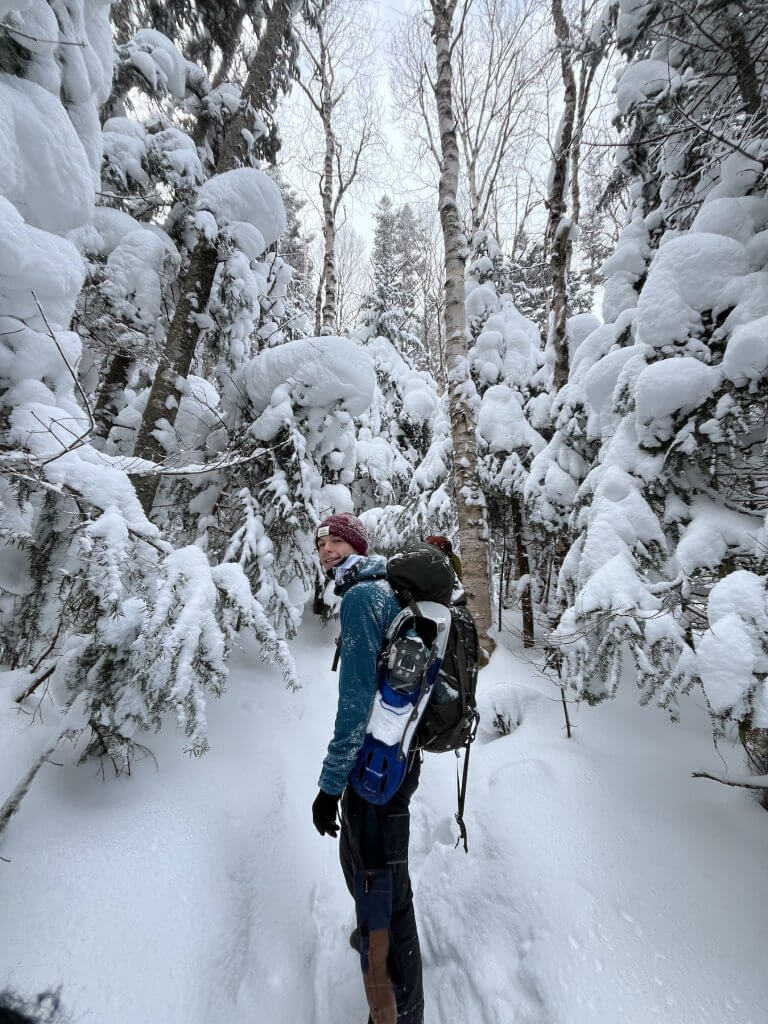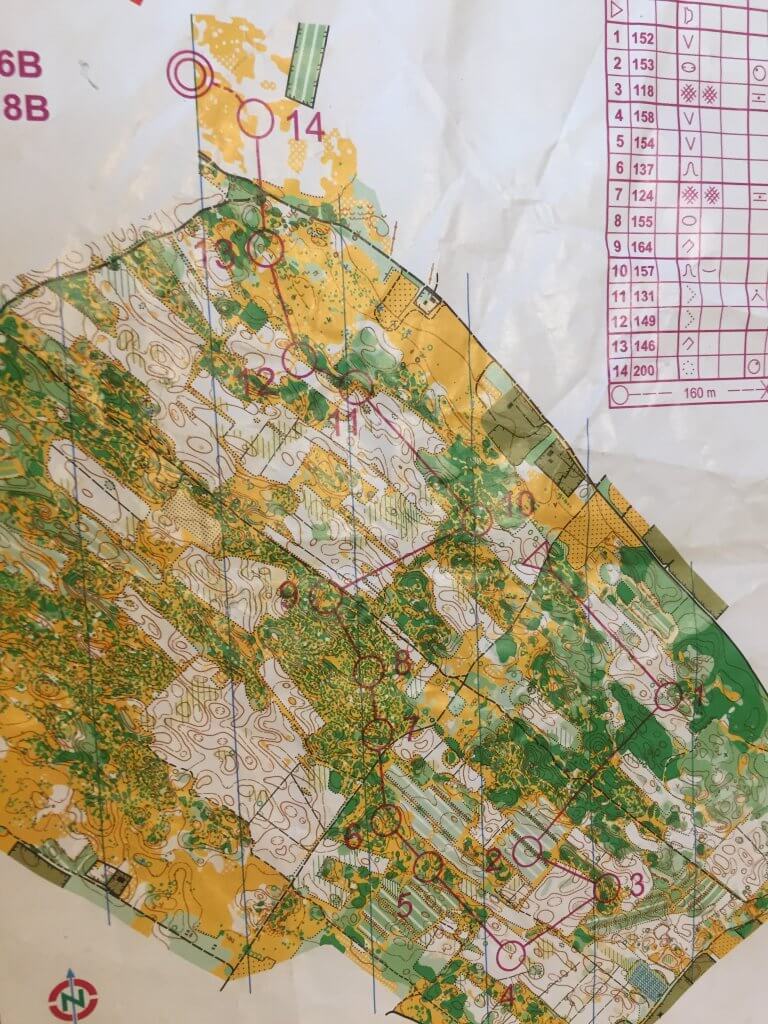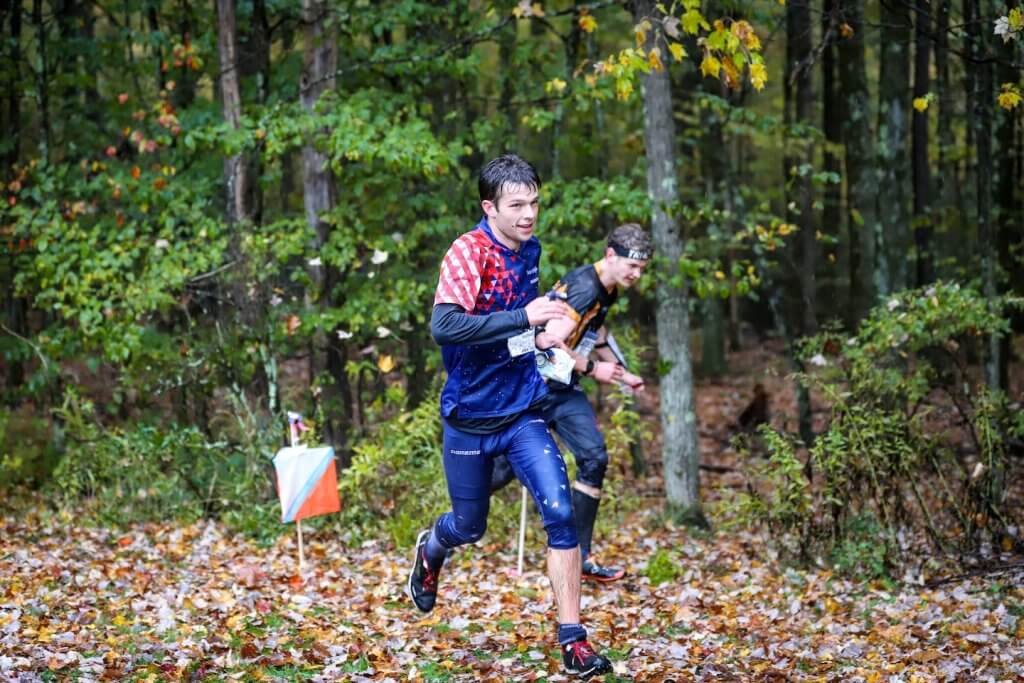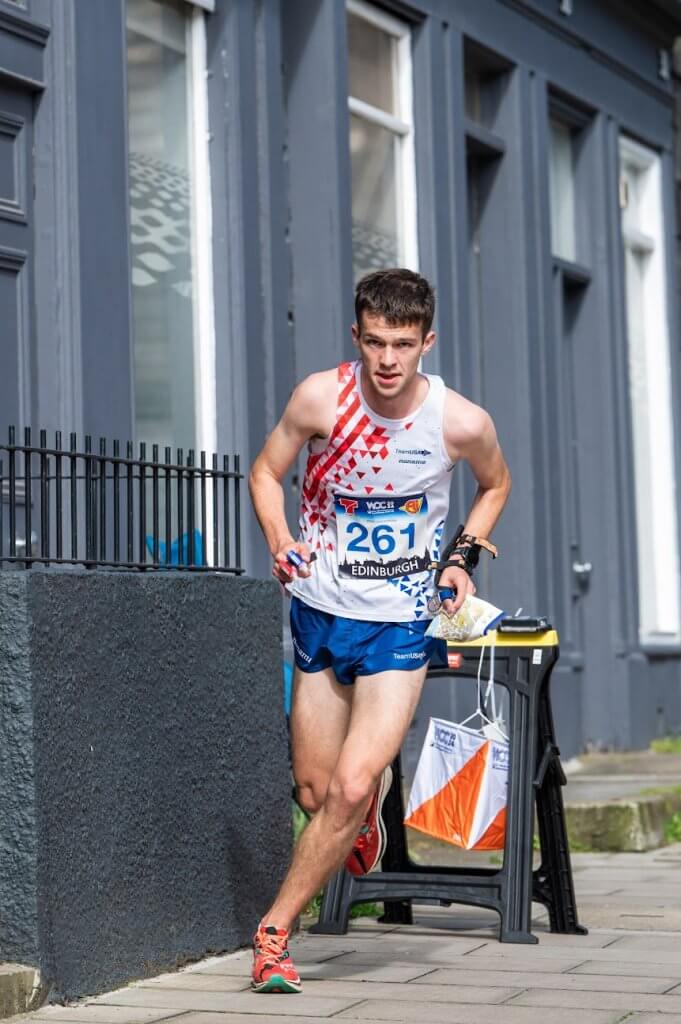
The OUSA April Spotlight is on National Team member (Elite Squa) Keegan Harkavy, from Cambridge, Massachusetts. This is a transcript of an interview with Keegan in April, 2025. It has been edited for clarity and length.
Cristina Luis: Welcome Keegan! I would like to hear how you got your start orienteering.
Keegan Harkavy: I had always known what orienteering was because I grew up next to Barb [Bryant] and growing up next to Barb, it’s kind of a foregone conclusion that you’ll know what orienteering is. I think somewhere in the recesses of my mind, I remember Barb always trying to get me and my two sisters to do it.
But it really started in sixth grade when she came into my school to teach us orienteering. And I can’t really remember what we did. I think we did some maze-Os, maybe some grids, but I remember really enjoying it. I was quite good at it and as a hyper-competitive sixth grader that was something that was exciting. I remember just having a good time and, Barb being Barb, she got really excited about this and pushed to get a team from Cambridge Street Upper School to go to Junior Nationals.
She started coaching us and she brought us to Junior Nationals. She put a lot of work into us. She would drive us places. She would feed us pizza. I remember a lot of games of Catan. And it was a very wholesome, welcoming community. And then we went to Junior Nationals and I think we did quite well. I ran Yellow and thought it was so hard and I remember getting to trail junctions and going the wrong way and being so upset with myself. But I really loved it and Barb made it super easy to continue. Once she stopped working with us, Ethan Childs was there. It was an easy way to enter orienteering, especially as someone whose family didn’t do it.
Barb and I share a driveway [in Cambridge, MA]. It was always easy to go do things. And one of the early meets I remember most specifically is when she took us to a Harriman [NY] training camp. That was the first time I think I remember actually orienteering. I did a control pick with Dave Yee following me and I think I missed every single control in the control pick. [Editor’s note: you can even read a blog post that Keegan wrote back then about the training camp.]
It was probably a 3k course that took me an hour and a half. I did not understand Harriman at all, but it was awesome. And again, we played board games when we got back. We cooked food. And to this day, that kind of intense training camp of three or four days, with food, board games, and orienteering is still what I live for and I think it is the most fun thing you can do over a weekend.
Yeah, that’s something I think we should be pushing our youth to do. You don’t have to go super far, just have a weekend like that.
Yeah. And to me, especially at that age, the maps didn’t matter. It was all just being with people. It was about the community. I love board games. So, the fact that we were playing Catan 24/7 was huge.
I came out to Southwest Spring Week in eighth or ninth grade and it was me, Ethan Childs and Erin Shirm living in a house together. We played every variant of Catan we could think of for a week straight. And it was again excellent orienteering. I remember that was when I learned how to do contours. We did a contour thing on the open terrain of Arizona where it was rolling yellow grass and being able to see them out in front of me was the first time I was like, “I can actually use these to navigate. They’re not just like a fun little thing on the map there for extra…”
Not just decorations!
Yeah, and I remember coming home from that and as we were driving I would see contours on the terrain around me. I would visualize the lines going across it and think I was some sort of superhero or something.
Yeah, I think you’re talking about the Route 83 areas. We call them the grassy yellow maps and you’re not the first person who has said that that’s where they first had contours pop for them and really see it. So that’s cool.
Yeah. Yeah.
It’s harder to see that stuff in New England woods.
Okay, so that describes your entry and school years. Were you able to keep orienting once you hit college?
Yeah, college has been an interesting experience. I think I’ve both been most attached and farthest from orienteering throughout college.
When I’m in school, I find it very hard to train. This is kind of on me. I think there are training opportunities. A lot goes on in Boston. I have access to a car. I could do a lot of New York events, but just like you get into a bubble of school, you do work, you do all the things. And it’s hard. Throughout college, I really have not done much besides go to big events. However, at the same time, I’ve felt myself really wanting to compete hard at certain points throughout college and really wanting to see how far I could push it. And every summer, I’ve actually been in Europe training. And that’s kind of how I’ve stayed mostly on top of orienteering skills in particular. Or things have gone well because I’ve kept in shape throughout the year. I’ve been running with a running club. I’ve run marathons. I’ve run half marathons.
I haven’t gotten exponentially faster, but I have continued to improve and I’ve continued to at least hold steady. So when I have had time to do really intense orienteering in the summer, I’ve had decent results. And also in particular in my sophomore year, I decided I really wanted to see how good I could get. And I was coming up to my last year of JWOC and I had an opportunity to study abroad. I picked Edinburgh where Thomas Laraia is training and where there’s a great team. I got to spend six months in Edinburgh training with the team. And that was by far the most I’ve ever trained. It was probably the best shape I’ve ever been in. It was not flawless because I got injured about halfway through from overtraining, but it really gave me an opportunity to try orienteering at a much higher level than the US provides.

There were much more frequent trainings, much higher level competition throughout. And again, while I was there, it was the most engaged in orienteering I’ve ever been and the most dedicated to results. I think in the US, it can be kind of hard to keep that fire alive. At least it has been for me. When I’m at school, no one knows what orienteering is. I’m surrounded by world-class athletes, and that can be motivating sometimes, but at Harvard they’re very separated from us. So, I find it demotivating a lot of the time. But there it was like, “I have a chance”. I’m racing against really good foreign orienteers in general. I’m holding my own. I feel like I’m getting faster. I feel like I’m getting better. And as a result of that, I did very well at JWOC that year, even being injured. That mindset of all or nothing that I was feeling really propelled me to do well there.
And when you’re getting good results, when you’re training and it’s feeling good, it’s really easy to keep wanting to do that.
And so now that you’re about to graduate you’re setting yourself up to do that? To be in a place where you can just train and compete and focus on orienteering?
Yeah, as I was looking at what to do next, I realized I had an opportunity to try training at an intense level for a year or two. I know from being at Harvard that when I’m working, especially in the US, I don’t have the right motivation or mindset for orienteering. I’m not amazing at splitting focus between work and orienteering.
So I began looking for ways to really orienteer hard for a year and see what I could accomplish, similar to what I did when I went to Edinburgh. But this time instead at the senior level. That idea was helped by the fact that [fellow National Team member] AJ [Riley] was also looking for basically this exact same thing. AJ was pretty sold on grad school. I applied for grad school but it was not really what I was looking for. I don’t think I know what I want to do in my life well enough to go spend money on grad school, and I haven’t worked in the same way AJ has to save up.
Harvard has a limited number of travel fellowships for graduating seniors, meant to help you develop professionally and as a person. Generally the travel bit of it is to give you deep cultural immersion in another country. They want you to be in one place and they want you to be learning a culture and learning about yourself in a way that you don’t really have to worry necessarily about the money you’re making or your career. This was quite exciting for me. This is something that I thought would give me a very good opportunity to both orienteer, grow as a person and be in a foreign country.
So, I submitted an application to teach orienteering in Sweden. I’ve done a ton of education work with orientering through Navigation Games. I have taught civics and taught at my religious school since 8th grade. They liked the idea, so I got a fair amount of money, and help with getting a visa.
Next year I’ll be Gothenburg, Sweden, living with AJ. The grant is for education, and I do have to write some reports on that, but the goal is really to see what I can do with orienteering and see how far I can push it. Also, to understand what orienteering, education, and the outdoors means to me going forward. Is this a thing that I want to continue at a high level? Is this a thing that I want to just go to the big meets, but not continue to train at a high level? Where does education fit into this? These are all questions I’m struggling with.
I don’t expect to answer all of them, but it will be a really cool opportunity and I’m excited to see what I can do. And we chose Gothenburg because really it seemed like the best place in the world to orienteer.
It is close to Norway, so, at least close to the best place.
Yeah. Yeah. We looked at Norway. We were thinking Sweden was a little bit cheaper,, maybe not quite as good a terrain, but pretty high level terrain…
I think in Gothenburg you’ll be able to train all winter in the terrain, which is harder to do in most of Norway. And the terrain in western Sweden offers good variety.
It’s cool. It’s like a university town as well, it seems like. So, a lot of young people.
This sounds like an awesome opportunity. Is this something open to anyone graduating student at Harvard?
There are a couple of different fellowships. It’s actually pretty competitive. This one is the URAF Postgraduate Travelling Fellowship. It’s just a few people who get it each year.
You mentioned something a little earlier about when you did your semester abroad in Edinburgh. You said that you got injured because you hadn’t been training as much before. Just this morning I had a conversation with a coach about this, where American orienteers go to Europe, which is great, and then they’re not ready for the training. So, when do you leave for Sweden and how will you prepare yourself physically?
Yeah, that’s a great question. If we rewind back to Edinburgh, I think why I got injured was twofold.
It was one, yes, the level of training was really high, but it was secondly that I was in a new country, in a new place, a little bit antisocial, I didn’t really know how to make friends super well. I wasn’t in school all that much. So orienteering became my whole social group. And not just that, it was when I wasn’t doing that, I had all this time on my hands and I just went, “I have time, I might as well train.” And there was definitely a personal side there of I just was going on long runs. I was personally putting in too much work and feeling good about it and seeing good orienteering results.
Mhm.
Coming into this year, I think there are two things I have to my advantage. One is that the year-long thing makes it a little easier. Back then I was training super hard for a race that was six months out and I knew that was all I had and I was like, “I want to be as good as I can for JWOC. I want to push as hard as I can.”
Secondly I was like, “This is all I’m doing.” In Sweden I will face the same issue. However, I think I have it a little bit easier because I have a year there. I think more time is good. I’m also less race dependent here. I’m not like training to do really well at WOC.

I’m just training to see how good I can get in general. so I have a little bit more flexibility in my training. I think also I am at a place in my life where I’m much better at making friends, much better at entertaining myself outside of orienteering. I think moving there with AJ will also help this. I will not be alone.
I will have a partner, someone going through a very similar situation. We’ll be able to keep each other dedicated and on a strict training schedule. Also on the social side, helping me go out and find things to do so running doesn’t become my only source of joy and how I deal with all of my emotions. Secondly, last time I finished my semester at home and went right to Scotland. And while at school I do train, it’s not at a high level. This summer I have most of the summer. I’m going to be traveling for some of July, but I’ll be back by August 1st and I won’t be leaving until at least the first week of September.
So, I’m hoping a designated training block of just base building, getting to a nice place, and then two or three weeks of getting my feet under myself there will help me stay a little bit more stable in the long run.
Mhm.
I’ve been injured a couple times now. That was my first injury and since then I’ve been injured a couple times. I think I know a little about how to take care of myself. I know a little bit better about what gets me injured.
I say that when I’m going to be running a marathon tomorrow on no training and I’m probably going to injure myself. [Editor’s note: Keegan ran a 3:03 marathon that day and did not injure himself!] Do as I say, not as I do. But I’m hoping that combination will be good. I also am hoping to rely on AJ quite a bit because I think he’s a very intelligent…
He’ll be your safety rail.
I think he thinks through his training pretty well, yeah.
Yeah. It sounds like you are being very thoughtful about how you’re approaching it.
Yeah..
There’s a little bit of experience and wisdom that comes into that. So you’re not going to race anything this summer?
I’m not racing this summer. And I’ve kind of taken the spring off.
So you really have nothing getting in the way.
Yeah.
Awesome. Sounds really good.
Okay, let’s do some rapid fire! What’s your favorite board game?
We’ll say Settlers of Catan. I don’t actually know if I still like to play it, but historically most hours in it.
Okay. What’s your college major?
Physics.
Favorite place you’ve orienteered?
Most interesting terrain I think was… Oh, I’m going to get ridiculed for this. Hungary 2018. I thought that JWOC was super cool. And then Uppsala, Sweden.
Oh, and Edinburgh for sprint. Edinburgh for sprint is the best in the world. It’s awesome.

Your favorite food.
Ice cream.
Give me your pet peeves.
…
I’m sure I have some.
Maybe you’re just a really chill person and you don’t have any pet peeves.
Yeah…I don’t have a lot of pet peeves, no.
I’ll give you a funny one. I don’t like when the finish is far from the area that you have to rest in, a remote finish.
That’s cool. An orienteering pet peeve specifically.
Not a fan.
That’s a good one. Read any good books recently?
Ooh. I’m reading Empire of Silence. It’s the first one. It’s the Sun Eater Chronicles. There are seven of them. I don’t actually know if they’re Chronicles. Very good.
How about TV shows? Are you watching any TV?
I haven’t watched anything good in a while.
Okay, that’s good then. Favorite sports teams? Do you watch any sports?
All Boston.
All Boston, that’s the right answer.
Yeah, I’m a fair weather Bostonian fan, which means I follow the Boston sports team that is doing the best at the moment.
So, right now it’s the Celtics.
Yeah, been that way for a couple of years.
And your proudest orienteering result?
The JWOC Relay 2023, in Romania. Or the Long that year.
Favorite hike?
My favorite mountain is Lafayette [in NH], taking the Old Bridle Path. You hit Lafayette and Little Haystack in Lincoln. I think it is stunning.
The favorite hike I’ve done is a week and a half backpacking trip with a friend of mine freshman year around Mount Blanc in Switzerland. The vibes were pretty immaculate.
That’s pretty awesome. Yeah. So, maybe this is going to be the same thing, but I was going to ask you what your most epic outdoor trip was.
That was the most visually epic. It wasn’t very challenging, we were staying at hotels every night.…
That’s awesome.
Yeah. Okay, when I was 11, I did the Long Trail, which was kind of crazy.
Who’d you do that with?
My mom. Yeah, she dragged me for 300 miles along that trail.
How long did that take you?
We did three weeks of it when I was 11 and I don’t think we quite finished. Then we went back a year or two later and finished it.
I did Owl’s Head two weeks ago and that was 12 and a half hours of hiking, five in the dark, snow everywhere. That was probably the most physically demanding hike I’ve ever done.
Awesome.
Okay, this is the last thing. What advice would you give to any young readers that want to get better at orienteering? What do they need to do? Other than live next door to Barb.
Yeah, that’s a good one.
I’ll give two pieces of advice. I think finding a community is the number one thing to do. And that kind of gives rise to the second piece of advice, which is just training consistently. I think you get excited about training by having a community. What’s kept me involved for all these years is every race I go to, I know I will love the people there.
And the other thing, I think is something that I do very well. Even though I don’t necessarily train as consistently as some of my peers or don’t do as much armchair stuff, I think I have a good mentality of racing. I get that through every time I see my peers and my friends. I want to compete with them. So I think having a good community of people that you’re not just friends with, but you’re in a little healthy rivalry with can be really good. I think it can be very easy in the US to not train hard, to go out to the woods and run for 45 minutes and do a training. Or go out on a run and run for 45 minutes just to kind of stay in shape.
And I think one of the things that really separates Americans from the Europeans is that they are attacking every single control out there. If you look at tracks you’ll see that they’re not statistically that much straighter than ours. They still make mistakes. And if you look at track times we have some pretty fast track runners. Not the fastest–top end JWOC people are crazy quick. At least on the men’s side some of us are fit enough to kind of compete there and I think the big difference comes down to that they train running high speed. They train bashing through the forest, which I think a good community helps you with. One of the things I was loving in Edinburgh was that any race I went to I knew I was going to have to push really hard if I wanted to do anywhere decently.
And the prevalence of sprint races helped there as well. With sprint races the navigation is easy enough that you can learn to do that. But I think back to me racing in JWOC when I was getting my best results that summer, I was not actually in much better shape–I’d been hurt for three months. I was definitely in better navigational shape, but I think the thing that I was really in the right mindset for was I was finishing every race as exhausted as I’ve ever finished a race. And I think in the US a lot of times I finish a race and I’m like okay I could go run another 10k because I’m held back by either my navigational skill or I’m just held back from being like that’s a big hill. I don’t want to run it.
And the best way I have of overcoming that hurdle, I think, is just finding people who you want to beat and racing them a lot.
Totally agree! Thank you for taking the time to chat today, Keegan, and good luck in Gothenburg!
